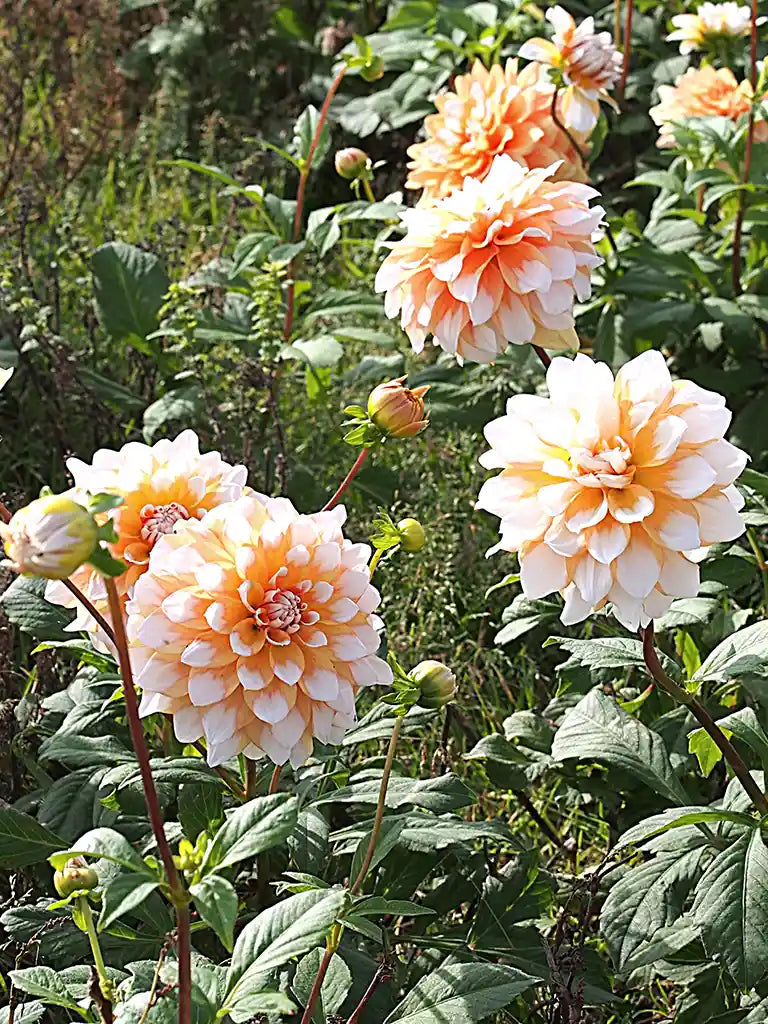Bloemoloog
Estimated Shipping Widget will be displayed here!
Couldn't load pickup availability
Organic dinnerplate dahlia
The Dahlia 'Seattle' grows to a height of 80 centimeters and initially has yellow flowers with white tips, but as the flowers develop they change to orange flowers with white tips. The flowers grow gigantic, making it a real eye-catcher!
A dahlia blooms for a very long time, up to 100 days a year, because countless flowers come back when you remove the spent flowers. A veritable sea of flowers, late in the season when most plants have already finished blooming.
We recommend combining this cultivar with the Dahlia 'Duet'!
How, where and when do I plant organic dahlia tubers?
Indoor pre-growth
A Dahlia 'Seattle' is not hardy. This allows the tubers to be grown indoors from March onwards. This gives a head start in growth and the dahlias bloom earlier. The plants can be put outside after the ice saints (May 15), or earlier if the weather is good, but be careful of night frost, then they will have to go back inside at night.
Outside in the garden
If you choose to wait until after frost before planting the dahlia tubers, it is best to do so until May 15. From then on, the tubers can be planted in the ground without the risk of frost and will bloom approximately 60 to 90 days later.
Plant the dahlia tuber with its old flower stem from last year upwards, just 2 to 3 centimeters below the ground and keep a distance of half a meter from tuber to tuber.
The planting time is until June.
Location
A dahlia prefers a sunny position in a nutrient-rich, water-permeable, preferably calcareous, sandy soil.
The Dahlia 'Seattle' grows to a meter high with medium-sized flowers, so it does not necessarily need to be supported, but it should be planted in a sheltered spot.
For pot planting, it is best to use a pot that is at least 40 centimeters wide, so that it does not dry out too quickly in the summer.
Care of the dahlia
Always keep the soil of the Dahlia 'Seattle' moist. Too dry soil can cause problems with growth and flowering.
During flowering, the spent flowers are removed for new blooms. The dahlia blooms until the first night frost. Cut the plant down to the ground. Protect the tubers planted in the open ground with leaves against light frost in winter. In severe frost they should be stored frost-free in a dry place. The advantage of digging out is that the tuber can be divided every year.
Feed the plant several times a year for optimal results. The dahlia is a fast-growing plant that can use a lot of nutrition.
We recommend Bio Kultura for organic potting soil, plant food and other soil improvers!
Propagation
The tubers continue to grow well in the autumn. Do not remove the tubers from the ground too early for propagation. Just before the first frost is the best time. The tubers can be split immediately, but this can also be done in the spring. The advantage of splitting in the spring is that small growth points can already be seen in the spring. This makes it easy to recognize where the tuber can best be split.
Edible
Everything about the Dahlia 'Seattle' is edible. The tuber tastes carroty and the flower can be used to garnish a salad or in a carafe with water, for decoration and to flavor the water.
Origin of the dahlia
Dahlias are native to Mexico and have been found in European gardens since the year 1615. Originally they were grown as tubers for consumption, but after discovering how beautiful they can be as ornamental plants, they grew into one of the most diverse plant species in the world, with a large number of cultivars.
Buy Organic Dahlia 'Seattle'
Skal NL-BIO-01 certified: 109459
Packaged individually or choose a stacking discount.
Stacking discount: B
Delivery within 5 working days!
EU shipping €8.95 - Free shipping from €100 purchase.
Characteristics
| Flowering time: | July - October |
| Planting time: |
From May (or from March indoors) |
| Planting depth: |
5 cm underground |
| Planting distance: | 50 cm apart |
| Height: |
80 cm high |
| Flower diameter: |
25 cm wide |
| Location: |
Partial shade, sun |
| Soil PH: | Loam, sandy soil - Slightly acidic/neutral |
| Winter hardiness: |
Not hardy |
| Propagation: | Good |
| Family: | Asteraceae (composite family) |
| Colour: |
Orange/white |
| Group: | Dinnerplate |
| Bee-friendly: | No |
| Fragrant: | No |
| Bulb size: | 1st size |
Other dahlia varieties

NL-BIO-01
To share






